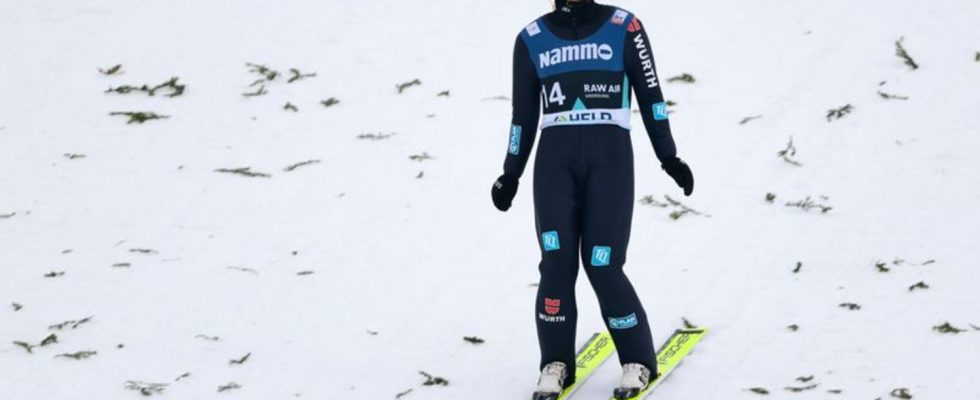Winter sports
“Trampled underfoot”: ski jumping and the equality of the hills
Katharina Althaus, now Schmid, from Germany in action. photo
© Geir Olsen/ntb/dpa
Equality is also a highly sensitive topic in ski jumping. The women are successful in their fight after more competitions – but in the end they feel overlooked.
Katharina Schmid was at least able to watch as the best ski jumpers in the world flew past her. The three-time world champion moved across the huge facility in Planica, Slovenia, with a grin on her face.
Her own jumping weekend had already ended after a competition on the normal hill. Schmid, formerly of Althaus, tried to find something positive about the end of the winter. After all, it was actually just a catch-up competition for a canceled jumping event Romania.
Other ski jumpers were not so diplomatic. Austria’s Eva Pinkelnig and the Norwegian record holder Silje Opseth openly expressed what they thought of the fact that the men were allowed to compete on the flying facility for an entire weekend and fly well over 200 meters – while the women had to go to the normal hill next door for a single competition it only goes 100 meters.
“A little bit fooled”
“We’re constantly being told what we can’t and aren’t allowed to do. They’re always decisions that are incredibly difficult to understand. Not only when it comes to ski jumping, but also everything around it,” Pinkelnig told ORF. You feel “a bit ripped off in good German”. Pinkelnig is 35 and has seen first-hand the progress women’s ski jumping has made over the past ten years: the discipline became Olympic, the World Cup program was expanded bit by bit, and media attention increased.
But that’s not enough for the jumpers. They are working towards equality on the hills and have felt massively set back several times in the last few weeks. World record holder Silje Opseth, who flew 236.5 meters (fall) and 230.5 meters (world record) in Vikersund in one day, was particularly affected by the plans in Planica.
“We’re actually being trampled on and don’t have much value. The boys are allowed to ski fly and do the coolest thing in the world, and we’re on the smallest ski jump. I really have to say, that’s disappointing,” said the frustrated Norwegian, who canceled her participation for Planica. In Vikersund, a jumping event that was canceled due to wind was not rescheduled – in contrast to the men, who simply held two competitions the following day.
Money plays a role
The reason: the money. According to Fis and race director Chika Yoshida, the national ski associations have to be able to finance the competition and are often dependent on a live broadcast on TV. This was not possible for the women in Vikersund, which is why the jumpers had one of their two flies canceled without replacement.
World-class ski jumper Martin Schmitt told the German Press Agency about the events of the past few weeks: “I understand the dissatisfaction. The effect is of course not good.” But Schmitt also sees the organizers’ side. In view of the profitability, equality is often more difficult for them than women would like. “It’s a problem that women have to fight more. It’s certainly easier in the men’s area to finance a World Cup competition. It’s a development process,” said Schmitt.
Hannawald doesn’t believe in half tours
It’s not just about TV money, but also about viewer numbers. This winter, Schmid and Co. jumped for the first time around the turn of the year in Oberstdorf and Garmisch-Partenkirchen. But unlike the men’s event, the stadiums were not sold out long in advance. 3,500 and 3,000 fans watched the two competitions.
The introduction of a Four Hills Tournament for women with all four stages is still pending. As of now, it doesn’t look like it will premiere in winter 2024/25. There is currently the “Two Nights Tour” with two competitions in Germany.
The jumpers consider this to be a first step. For Sven Hannawald, the last German winner of the event, it’s not even that. “If there is a women’s tour, then it’s the original one. It starts in Oberstdorf and ends in Bischofshofen. I don’t believe in one at all “Setting up an alibi tour and then doing something all over the place,” said Hannawald.

